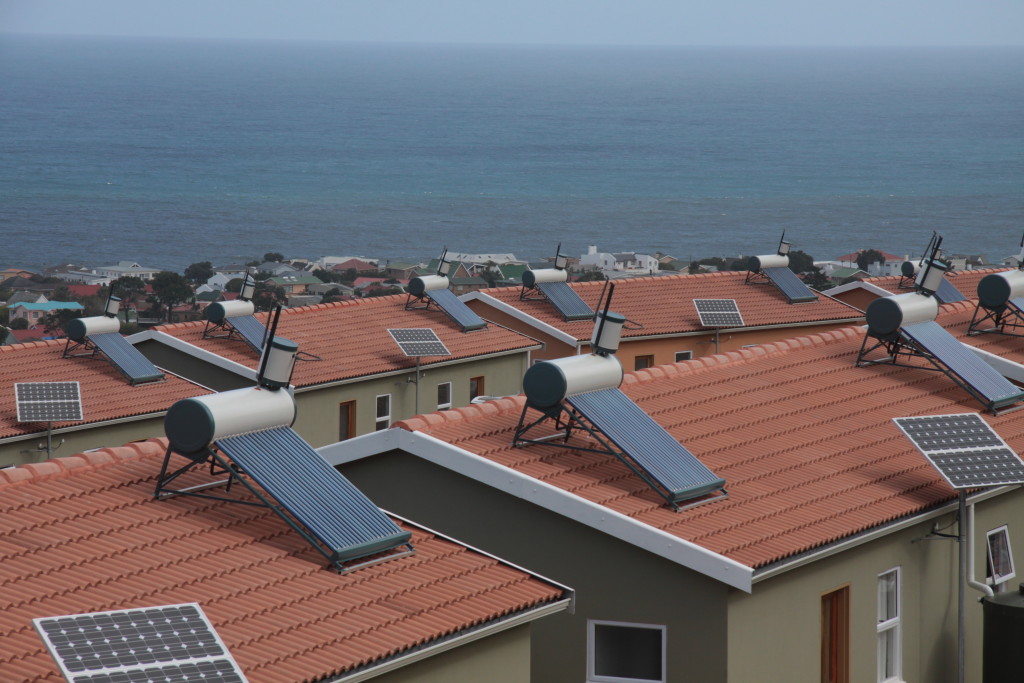Q1. What are different types of solar water heating systems?
A1. A variety of systems are available in the market but mostly can be characterised in the following categories:
- Based on collector type: ETC/FPC
- Based on pipe and system pressure: Pressurised/Non pressurised
- Based on system construction material: SS/GI
Evacuated tube collector (ETC) based systems are most common these days and are based on advanced vacuum tube technology. Stainless steel (SS) systems look better and last longer compared to galvanised iron (GI) based systems, however demand 10-15% premium. In dwellings with pressure pumps, pressurised systems need to be installed.
Q2. How much litres of hot water will be generated from solar water heating system?
A2. System capacities are defined in litres per day (LPD). Which means that a 100 LPD system on an average would be able to deliver 100 litres of water at 60C on a given day.
Q3. How much approximate area is required for SWH systems?
A3. ETC type solar water systems generally require close to 15ft2 of clean rooftop space per 100LPD of installed system. However this figure can be very different for larger systems. For e.g. 300LPD system would require about 40-45ft2 of roof space whereas 4000LPD system would require roughly 1500ft2.
Q4. How much does it cost to install a solar water heating system?
A4. Cost of solar water heater depends on size and type of system installed. As a rule of thumb, price varies between Rs. 15,000 to Rs. 20,000 per 100LPD of installed capacity. Plumbing to and from the system generally charged extra at actuals. The cost, however, does not increase linearly with increase in capacity; rather it comes down proportionately as we go for higher capacity system.
Q5. What is time required to complete SWH installation?
A5. For site with clear roof access and ready inlet and outlet piping, SolarSmiths expert team can deliver, install and commission a solar water heating system in less than 5 days.
Q6. What are the subsidies or capital support from the government?
A6. As on date due to economic viability of solar water heating systems, the government has discontinued all schemes w.e.f 12.08.2014 onwards.
Q7. What happens on a cloudy/rainy day? Do I still get hot water?
A7. The tank is sufficiently insulated to provide hot water for 1-2 days. However in case of emergencies, the system is fitted with an electrical heater to provide hassle free solution even in long spells of rainy/cloudy days.
Q8. What are the savings and indicative total payback time of the system?
A8. System savings can vary from region to region, hence rough calculations are provided below for four major geographical zones:
- North Zone: 1000 kWh per 100 LPD of installed capacity. Which means that 300LPD system will save roughly 3000 units of electricity in a calendar year.
- South Zone: 1500 kWh per 100 LPD of installed capacity. Which means that 300LPD system will save roughly 4500 units of electricity in a calendar year.
- East Zone: 1000 kWh per 100 LPD of installed capacity. Which means that 300LPD system will save roughly 3000 units of electricity in a calendar year.
- West Zone: 1250 kWh per 100 LPD of installed capacity. Which means that 300LPD system will save roughly 3750 units of electricity in a calendar year.
This can amount to significant monetary savings. For northern region, assuming electricity tariff of Rs. 10/kWh, the savings can be as high as Rs. 10,000/year/100LPD. This means the return on investment can be as low as 2 years. For further details, refer to the schedule of benefits document.
Q9. What size of system is sufficient for me?
A9. For a house with one bathroom and 1 to 2 members, 100 LPD capacity system should be sufficient. For a 4-6 member house, a 300LPD system is recommended. For more numbers of bathrooms, the capacity will increase accordingly due to pipe losses & more number of family members. Generally the capacity is decided based on hot water required in mornings for bathing. If the usage is in evening & at other times also, the capacity is decided accordingly. Some useful thumb rules for estimating the hot water requirement as per MNRE, are given below:
|
Application |
Typical requirement of hot water at 60C in per person per day |
|
Household bathing using buckets |
5-20 litres per bath |
|
Household bathing using shower with mixing tap |
20-30 litres for regular 10-15 min bath |
|
Shaving with running tap |
7-10 litres |
|
Bathing in bath tub |
50-75 litres per bath |
|
Wash basin with mixing tap (Hand wash, brushing of teeth wtc.) |
3-5 litres |
|
Kitchen washing |
2-3 litres |
| Dishwasher |
40-50 litres per cycle |
|
Clothes washing machine |
40-50 litres per cycle |
Q10. What are indicative maintenance costs for the SWH system?
A10. Solar water heating system do not need significant maintenance requirements. Leakages in the plumbing system (if any) could be easily repaired by common plumbers. In case quality of water is hard, scale deposition in the tubes/collectors may result over the years. This may require de-scaling with acids by authorised partners. Broken glass/tubes can also be replaced by our partners easily at minimal costs.
Q11. What are standard warrantees applicable on the product and the expected lifespan of the system?
A11. Solar water heating system is warranted for 5 years for any manufacturing defects and system lasts more than 10 years. However lifetime generally depends on quality of water and hardness at site but in most urban environments, 10-15 years can be achieved.
Q12. What is the importance of choosing good installer or system?
A12. Solar water heating system being a long-term investment depends heavily on quality of workmanship, right mix of products and system design. Solarsmiths, being a leading engineering procurement and construction organisation with a team of formally trained solar professionals, state of the art infrastructure and adequate resources, ensures maximum returns from your solar investments.
Contact us today for your customised solar solution or read more such articles on http://www.solarsmiths.com/blog/

